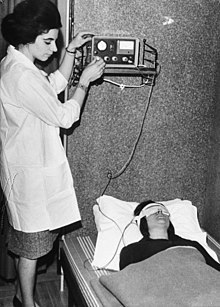
Behavioral sleep medicine (BSM) is a field within sleep medicine that encompasses scientific inquiry and clinical treatment of sleep-related disorders, with a focus on the psychological, physiological, behavioral, cognitive, social, and cultural factors that affect sleep, as well as the impact of sleep on those factors.[1][2][3][page needed] The clinical practice of BSM is an evidence-based behavioral health discipline that uses primarily non-pharmacological treatments[3] (that is, treatments that do not involve medications). BSM interventions are typically problem-focused and oriented towards specific sleep complaints, but can be integrated with other medical or mental health treatments (such as medical treatment of sleep apnea, psychotherapy for mood disorders).[4] The primary techniques used in BSM interventions involve education and systematic changes to the behaviors, thoughts, and environmental factors that initiate and maintain sleep-related difficulties.[3][4]
The most common sleep disorders that can benefit from BSM include insomnia,[5] circadian rhythm sleep-wake disorders,[6] nightmare disorder,[7] childhood sleep disorders (for example bedwetting, bedtime difficulties),[8] parasomnias (such as sleepwalking, sleep eating),[9] sleep apnea-associated difficulties (such as difficulty using continuous positive airway pressure),[10] and hypersomnia-associated difficulties (for example daytime fatigue and sleepiness, psychosocial functioning).[11]
- ^ Ong, Jason C.; Arand, Donna; Schmitz, Michael; Baron, Kelly; Blackburn, Richard; Grandner, Michael A.; Lichstein, Kenneth L.; Nowakowski, Sara; Teixeira, Celso; Boling, Karlyn; C Dawson, Spencer (November 2018). "A Concept Map of Behavioral Sleep Medicine: Defining the Scope of the Field and Strategic Priorities". Behavioral Sleep Medicine. 16 (6): 523–526. doi:10.1080/15402002.2018.1507672. ISSN 1540-2010. PMID 30118323. S2CID 52033291.
- ^ Stepanski, Edward J. (2003). "Behavioral sleep medicine: a historical perspective". Behavioral Sleep Medicine. 1 (1): 4–21. doi:10.1207/S15402010BSM0101_3. ISSN 1540-2002. PMID 15600134. S2CID 7515944.
- ^ a b c [page needed]Treating sleep disorders : principles and practice of behavioral sleep medicine. Perlis, Michael L., Lichstein, Kenneth L. Hoboken, N.J.: Wiley. 2003. ISBN 0-471-44343-3. OCLC 50913755.
{{cite book}}: CS1 maint: others (link) - ^ a b Cite error: The named reference
:0was invoked but never defined (see the help page). - ^ Qaseem, Amir; Kansagara, Devan; Forciea, Mary Ann; Cooke, Molly; Denberg, Thomas D.; Clinical Guidelines Committee of the American College of Physicians (2016-07-19). "Management of Chronic Insomnia Disorder in Adults: A Clinical Practice Guideline From the American College of Physicians". Annals of Internal Medicine. 165 (2): 125–133. doi:10.7326/M15-2175. ISSN 1539-3704. PMID 27136449. S2CID 207538494.
- ^ Cite error: The named reference
:7was invoked but never defined (see the help page). - ^ Cite error: The named reference
:4was invoked but never defined (see the help page). - ^ Cite error: The named reference
:5was invoked but never defined (see the help page). - ^ Drakatos, Panagis; Leschziner, Guy (November 2019). "Diagnosis and management of nonrapid eye movement-parasomnias". Current Opinion in Pulmonary Medicine. 25 (6): 629–635. doi:10.1097/MCP.0000000000000619. ISSN 1531-6971. PMID 31408014. S2CID 199547831.
- ^ Cite error: The named reference
:8was invoked but never defined (see the help page). - ^ Ong, Jason C.; Dawson, Spencer C.; Mundt, Jennifer M.; Moore, Cameron (2020-08-17). "Developing a cognitive behavioral therapy for hypersomnia using telehealth: a feasibility study". Journal of Clinical Sleep Medicine. 16 (12): 2047–2062. doi:10.5664/jcsm.8750. ISSN 1550-9397. PMC 7848927. PMID 32804069.
© MMXXIII Rich X Search. We shall prevail. All rights reserved. Rich X Search
